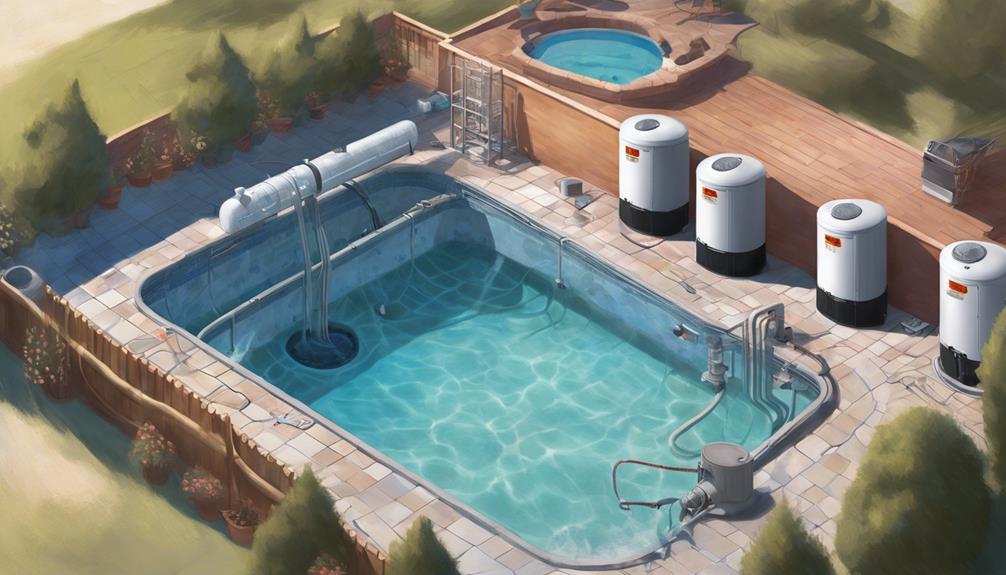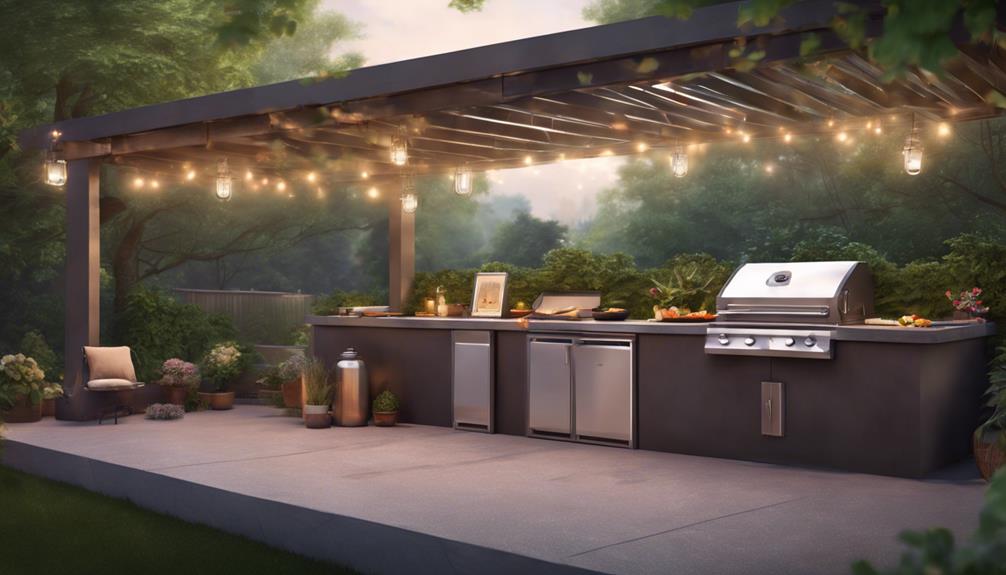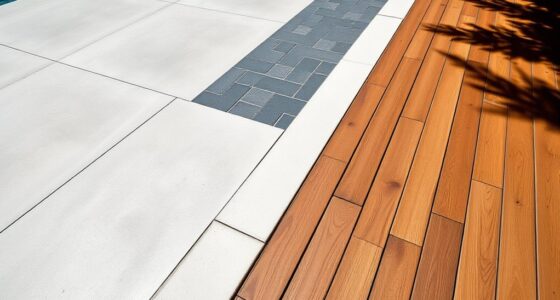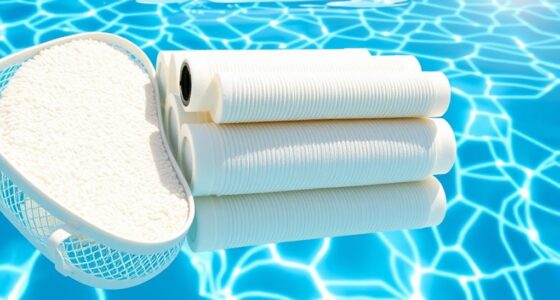To make your choice for the perfect pool heater, you should consider the benefits of Solar Pool Heaters, which are known for their eco-friendly heating and long lifespans, compared to Electric Heat Pumps, which provide energy-efficient options. Gas Pool Heaters are recommended for colder climates with higher heating capacity. Solar heaters are cost-effective, while electric pumps offer advanced heat transfer technology. Gas heaters typically have a monthly cost ranging from $300 to $500. The decision on which type of heater to choose depends on your priorities, budget, and climate. Each type has its own advantages and factors to consider, so it is important to carefully evaluate your needs in order to make an informed decision.
Key Takeaways
- Solar pool heaters are environmentally friendly, long-lasting, and cost-effective options for harnessing the sun's energy efficiently.
- Electric heat pumps offer advanced technology, energy efficiency, and a lifespan of 10-20 years with moderate monthly operating costs.
- Gas pool heaters are ideal for colder climates, providing higher heating capacity but with higher monthly expenses.
- Consider solar pool heaters for sustainable and reliable heating, or electric heat pumps for top-rated efficiency and reliability.
- Explore models like Smartpool S601P and Hayward CSPAXI11 for solar and electric heat pump options that offer reliable performance.
Solar Pool Heaters
Harnessing the sun's rays efficiently, solar pool heaters utilize solar panels to provide an environmentally friendly and long-lasting heating solution for pools. By capturing solar energy, these heaters can maintain your pool at a comfortable temperature while reducing your carbon footprint.
Installed on roofs for ideal exposure to sunlight, solar pool heaters are recommended for their durability, with a lifespan of 15-20 years. Despite an initial installation cost ranging from $2,500 to $9,000, the long-term savings on energy bills make them a cost-effective choice.
Popular models like Smartpool S601P and XtremepowerUS offer reliable performance, making solar pool heaters a sustainable and effective option for heating your pool.
Electric Heat Pump
Utilizing advanced technology, electric heat pumps efficiently transfer heat from the air to the water in your pool, offering an energy-efficient and durable heating solution.
These pumps are designed to be long-lasting, with a typical lifespan ranging from 10 to 20 years.
While the initial installation cost can vary between $2,000 and $7,000, the monthly operating expenses typically fall within the range of $50 to $100 or more, depending on usage.
Some of the top-rated electric heat pump models on the market include the Hayward CSPAXI11, Fibropool FH 220, and Ecosmart US Smart Spa 11.
With their ability to maintain comfortable water temperatures and cost-effective operation, electric heat pumps are a popular choice for pool owners looking for reliable heating solutions.
Gas Pool Heater
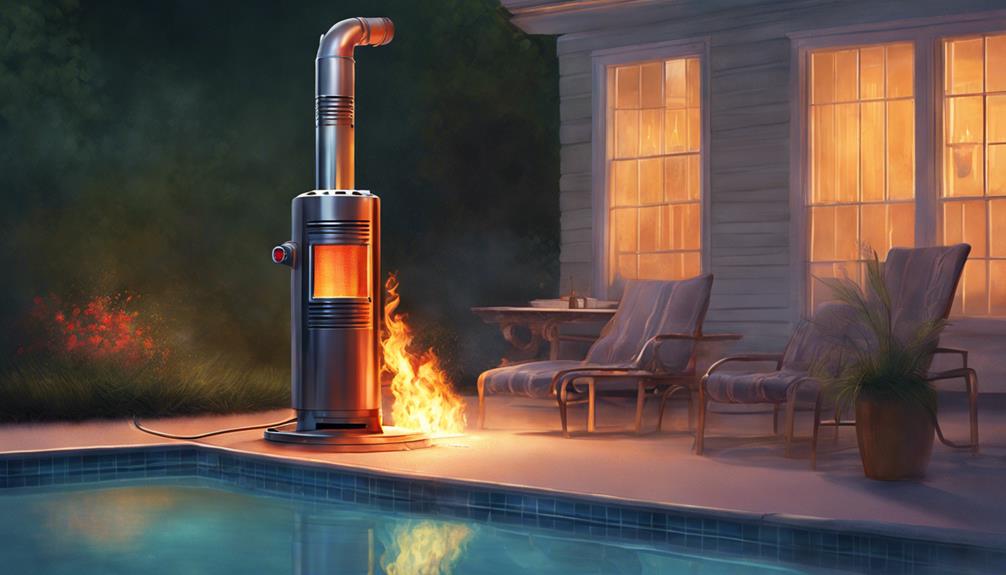
Electric heat pumps provide an energy-saving and long-lasting heating solution for pools, but for those in colder climates or looking for a higher heating capacity, gas pool heaters offer a different choice.
Gas pool heaters utilize either natural gas or propane to effectively heat pools, making them appropriate for areas with colder temperatures. With a monthly cost ranging from $300-$500 and an initial investment between $1,500-$6,000, gas pool heaters present a dependable solution for maintaining pool temperatures between 80-90 degrees. Highly-rated models like Hayward H250FDN and Pentair 460736 are recognized for their performance and durability.
When choosing a gas pool heater, it is crucial to assess the pool's size and desired heating speed, ensuring maximum comfort and usage.
Frequently Asked Questions
How Do I Know if My Pool Is Suitable for a Heat Pump or Solar Heater?
To determine if your pool is suitable for a heat pump or solar heater, consider factors like climate, space availability, and budget. Solar heaters are ideal for sunny regions, while heat pumps work well in moderate climates with enough space for installation.
Can I Install a Pool Heater Myself, or Do I Need Professional Help?
Installing a pool heater yourself can be challenging and risky. Professional help guarantees proper installation, minimizing potential issues and ensuring safety. One example is John, who saved money initially but faced costly repairs due to improper installation.
Are There Any Government Incentives or Rebates for Installing a Pool Heater?
There are various government incentives and rebates available for installing pool heaters. These incentives aim to promote energy efficiency and environmental sustainability. To explore potential rebates, contact local authorities or visit official energy efficiency websites for detailed information.
Do Pool Heaters Require Regular Maintenance or Servicing?
Pool heaters require regular maintenance to maximize performance. This includes cleaning filters, checking for leaks, inspecting components, and servicing as needed. Regular maintenance helps extend the lifespan of the heater and promotes efficient operation.
What Is the Environmental Impact of Each Type of Pool Heater?
When evaluating pool heaters, consider their environmental impact. Solar heaters are eco-friendly, electric heat pumps are energy-efficient, and gas heaters produce emissions. Choose wisely to minimize your carbon footprint and enjoy a sustainable pool heating solution.
Are Quick and easy pool upkeep tips related to choosing the perfect pool heater?
Looking for the perfect pool heater for summer pool upkeep? Quick and easy pool upkeep tips can be related to choosing the right pool heater to maintain a clean and comfortable swimming environment. Keep your pool in top shape with these summer pool upkeep unveiled recommendations.
Conclusion
To wrap up, selecting the ideal pool heater is an important decision that can greatly impact your comfort and enjoyment.
By considering factors such as installation costs, monthly expenses, and heating power requirements, you can make an informed choice that suits your specific needs.
Remember, 'Measure twice, cut once' – taking the time to research and plan before making a decision can lead to a more satisfying outcome in the long run.

